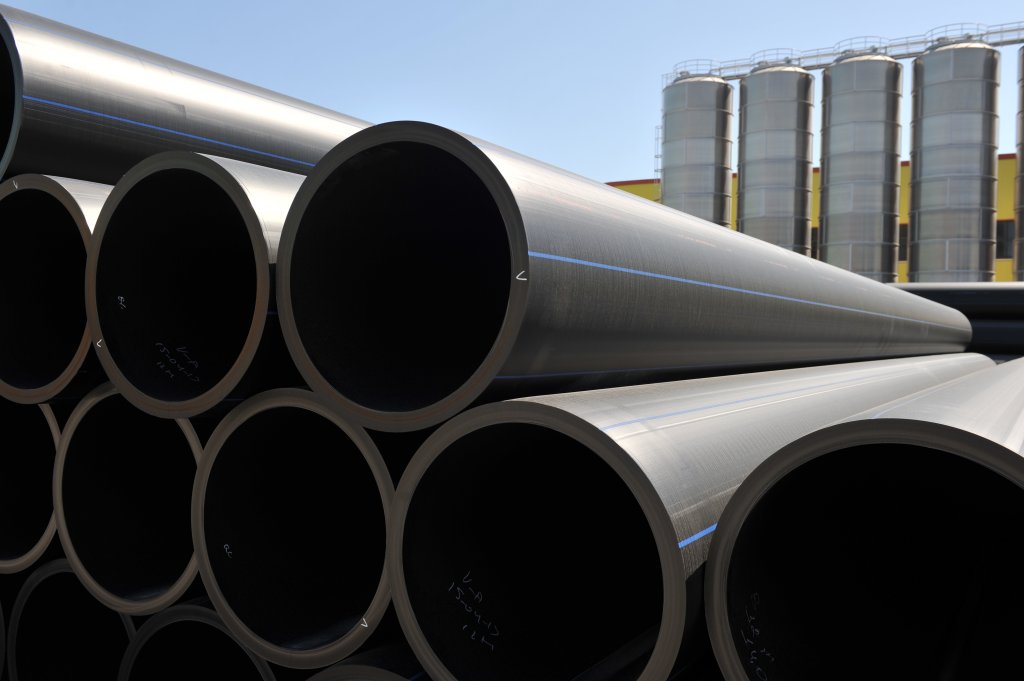Understanding the Secret Advantages of HDPE Pipeline for Water and Wastewater Administration
The use of HDPE pipeline in water and wastewater monitoring provides numerous advantages that warrant consideration. Its extraordinary resilience and lengthy life-span make it a favored choice for several jobs. Furthermore, the material's resistance to deterioration and chemical damage boosts its dependability in different settings. The advantages extend past just longevity and resistance. Pipe Manufacturing Midland TX. Discovering its cost-effectiveness and environmental effect discloses much more engaging reasons for its widespread fostering in contemporary infrastructure
Phenomenal Toughness and Longevity

HDPE pipe stands out for its exceptional resilience and longevity, making it a favored selection in water management systems. Built from high-density polyethylene, these pipes can withstand considerable stress and tension, making sure reliable efficiency gradually. Their robust nature permits them to withstand severe ecological problems, consisting of temperature level changes and dirt activities, which can cause various other materials to fail.
The lifespan of HDPE pipes typically exceeds 50 years, supplying a cost-efficient remedy for towns and industries alike. Additionally, the product's lightweight residential or commercial properties simplify installment, minimizing labor expenses and durations. This sturdiness reduces the demand for constant repair work or substitutes, better boosting its economic appeal.
In water management applications, the integrity of HDPE pipelines means less interruptions and improved solution connection, making them essential to lasting infrastructure development. The mix of toughness and longevity strengthens HDPE's function as a foundation in effective water monitoring services.

Resistance to Rust and Chemical Damages
While lots of products catch corrosion and chemical damage gradually, HDPE pipelines display exceptional resistance, making them suitable for different water monitoring applications. This resilience stems from the molecular framework of high-density polyethylene, which is inherently non-reactive and does not corrode like metals or degrade from direct exposure to extreme chemicals. Consequently, HDPE is very reliable in environments with aggressive substances, such as wastewater systems that may contain acids, bases, and organic solvents.
Additionally, HDPE pipes can endure environmental aspects such as dirt acidity and saline conditions, additionally improving their suitability for varied applications (American Plastics HDPE Pipe for Oilfield). Their ability to keep architectural stability with time lowers the danger of leaks and failings, which is crucial in making sure the security and reliability of water distribution and wastewater monitoring systems. The resistance to deterioration and chemical damages significantly contributes to the overall effectiveness and longevity of HDPE piping services.
Cost-Effectiveness and Financial Benefits
When taking into consideration the monetary ramifications of water administration systems, the cost-effectiveness of HDPE pipes ends up being evident. These pipelines use reduced setup and maintenance costs compared to traditional materials like steel or concrete. Their light-weight nature simplifies transport and setup, resulting in minimized labor costs. In addition, HDPE pipes exhibit a lengthy life expectancy, typically going beyond 50 years, which converts to fewer substitutes and long-lasting cost savings.
The resistance of HDPE to deterioration and chemical damages decreases the need for costly repair work and replacements. The pipelines additionally support efficient water circulation, reducing energy expenses related to pumping systems. By alleviating leakages and water loss, HDPE pipelines add to significant economic advantages for communities and industries alike. Generally, the preliminary financial investment in HDPE piping can produce significant financial returns over the lifespan of the water administration system, making it a sensible choice for sustainable infrastructure growth.
Environmental Sustainability and Lowered Influence

Versatility and Flexibility in Installment
As a result of their special properties, HDPE pipes use impressive convenience and versatility in setup, making them appropriate for a variety of applications. Their light-weight nature permits much easier handling and transportation, minimizing labor expenses and installment time. HDPE pipes can be bent and shaped to fit numerous terrains and task requirements, which is particularly useful in challenging environments.
Additionally, their resistance to rust and chemical damages permits installation in varied setups without the need for specialized safety finishes. The ability to fuse joints produces a continual, leak-free system, enhancing the overall stability and dependability of the installment. HDPE's versatility likewise suits ground activity, minimizing the danger of damages in locations vulnerable to changing soil. Generally, these characteristics make HDPE pipelines not just versatile but sites additionally a preferred choice for water and wastewater monitoring systems.
Often Asked Concerns
Exactly How Does HDPE Pipe Contrast to PVC in Water Monitoring Applications?
HDPE pipeline supplies superior versatility, resistance to rust, and sturdiness compared to PVC. Its lighter weight assists in less complicated installment, while its long life-span decreases substitute costs, making HDPE a preferred option in water management applications.
What Is the Life-span of HDPE Piping Under Common Conditions?
Under typical problems, HDPE pipes can have a life-span ranging from 50 to 100 years. Their longevity and resistance YOURURL.com to corrosion add to their long-term performance in numerous applications, making them a trusted choice for framework.
Are HDPE Water Lines Recyclable After Their Solution Life?
Yes, HDPE pipes are recyclable after their life span. Pipe Manufacturing Midland TX. They can be refined and repurposed into new items, significantly decreasing ecological effect and promoting sustainability within the market, making them an environment-friendly selection for piping options
What Is the Installation Refine for HDPE Water Lines?
The setup process for HDPE pipelines entails website prep work, trenching, pipeline combination or mechanical joining, backfilling, and stress testing. Appropriate strategies ensure a long lasting and effective system for carrying water and wastewater effectively.
Can HDPE Pipes Be Made Use Of for Both Potable and Non-Potable Water Equipments?
Yes, HDPE pipelines can be used for both potable and non-potable water supply. Their flexibility, sturdiness, and resistance to deterioration make them ideal for various applications, making certain safe and effective transportation of water in various contexts.